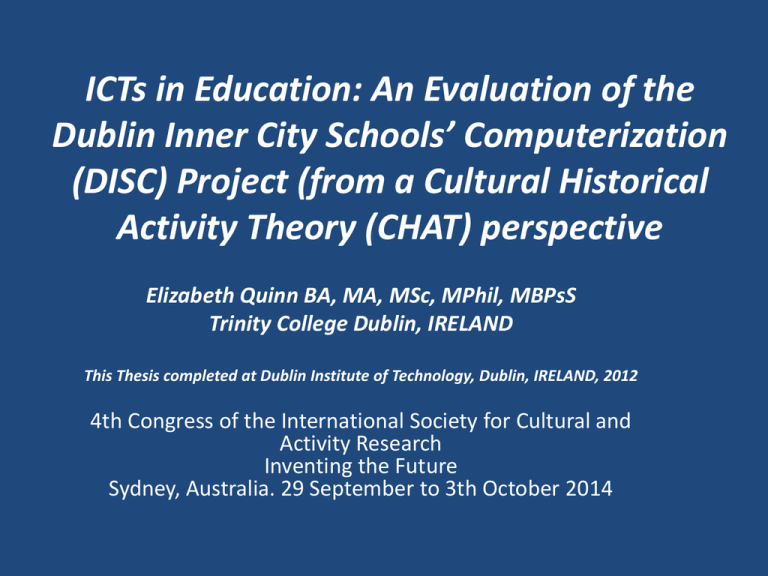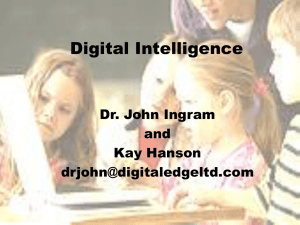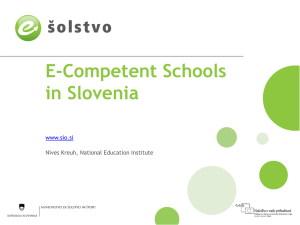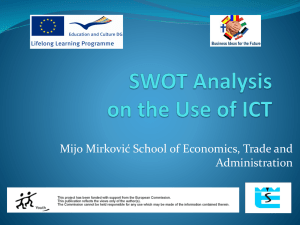Elizabeth Quinn, Ireland disc Pres_STEM_ISCAR 2014_SYDNEY
advertisement

ICTs in Education: An Evaluation of the Dublin Inner City Schools’ Computerization (DISC) Project (from a Cultural Historical Activity Theory (CHAT) perspective Elizabeth Quinn BA, MA, MSc, MPhil, MBPsS Trinity College Dublin, IRELAND This Thesis completed at Dublin Institute of Technology, Dublin, IRELAND, 2012 4th Congress of the International Society for Cultural and Activity Research Inventing the Future Sydney, Australia. 29 September to 3th October 2014 What is DISC? 2 Aims and Objectives of DISC Aim: • to integrate use of innovative technology in schools Objectives: • To help teachers meet the ICT requirements of the Primary School Curriculum and Secondary School Curriculum • provide an added dimension to the use of ICT in secondary schools 3 Purpose of this Research Evaluate the effectiveness of DISC – Were objectives met? – Should MLE be rolled out? – Suggestions for future? Why evaluate? – Varied levels of commitment and use of ICT – Was technology used innovatively? – Curriculum implemented using ICT? – Teacher training/skills - underdeveloped 4 Theoretical Framework Cultural Historical Activity Theory (CHAT) (Source: Engeström 1987, p. 78) (Engestrom (1987) 5 Why use Cultural Historical Activity Theory? • “Theoretical lens and analytical tool”(Barab, 2004, p. 30) • “seeks to analyse development within practical social activities” • Activity: Central to AT Focuses on “practice of group of users” rather than individuals • Encourages use of variety of research methods (Sannino, Daniels and Gutierrez 2009, p. 1) • (Bodker 1989, p.173) 6 Questions for Researchers to ask 7 Activity Evaluation of: The use of ICT in 38 primary and secondary schools in the Dublin Inner City Schools Computerization project 8 Subjects • DISC staff • 38 schools in disadvantaged areas (primary and secondary) • Teaching staff • • • • Principals ICT coordinators IT postholders Teachers Primary School pupils – aged 4-12 Secondary School pupils – aged 12-18 9 Tools • ICT AND LNI PROJECTS – PCs, Laptops, whiteboards • ICT PROJECTS • • • • • • • Lego technology Mp3 players/recorders Animation software Video making/Multimedia (Photostory and Powerpoint) Games Development (Game Maker) Podcasting 3-D (Sketch up) • MLE/LNI PROJECT – LNI platform 10 Division of Labour DISC Students ICT coordinators School Teachers 11 Rules and Regulations 12 Community DISC Principals/ Board Students Teachers ICT coordinators 13 Methods Used: 1. Questionnaires: – 152 Questionnaires to 38 schools – 72 returned (46.6%) • Funder/DISC requirement • Compare with interviews 2. Case Study approach – 6 schools (varied commitment/3xMLE) • Different views – Interviews (20): • Semi-structured – same questions – Focus groups: • 3 school classes (age 9, 11, 15) – 2 x Primary, 1 x Secondary • Get student views – Classroom observations : • 3 class groups at primary level (age 4/5, age 9, age 11) • ICT in action 14 Questionnaires Case Study approach Interviews (20) teachers/DISC Focus Groups (3) - age 9, 11, 15)) Classroom Observations (3 class groups) 15 Findings– main issues 1. 2. 3. 4. 5. 6. 7. 8. 9. Teacher motivation/beliefs Teacher Training Influence of Principal and School Policies Technical support/hardware replacement ICT coordinator role Students’ interaction Government policy/administration DISC staff support/DISC objectives MLE pilot 16 1. Teacher motivation/beliefs ‘Making a difference’ “Our mission in the school is to equip these kids to go out and make something of their lives” (Principal, PP 2) Focus on ‘pupil engagement’ Little research on ‘outcomes’ + ‘disadvantage’ (Blackmore, Hardcastle & Bamblett, 2003) Some teachers using ICT innovatively BUT Whiteboard as ‘glorified blackboard’ (Karasavvidis 2009) Teacher age/ICT experience not major factor Traditional/constructivist approach? Policy can influence teacher change (Hermans et al. 2008) (Drent & Meelissen, 2008) 17 2. Teacher Training Key issue (Meisalo 2010) Too focused on skills ( Lack of training -pedagogical use of ICT Hew and Brush , 2007 in Vanderlinde and van Braak, 2010, p. 545) 53% did not receive ICT training pre-service 72% - ICT did not prepare for teaching 81% - some ICT training – post (mostly DISC) should be subject specific (OECD - Enocchsson, 2010) “They really want to integrate IT into teacher training to be part of the daily life. I think continuous teacher training – like I think in any job... You don’t qualify, graduate, and that’s it, that’s your education cap in. Like that day is gone” [Interview, T2, Ps 3] 18 3. Principal/School Policy influence Teachers – Principal’s attitude crucial “If the Principal isn’t in favour, you can forget it”(ICT coord, PS3) School ICT Policy/DES support “the Department always expected us to have plans and they didn’t have a plan” …were giving money willy nilly” (Principal, PP 1) “fractured delivery of digital technologies” (Marshall and Anderson, 2008, p. 474) Driving change -teacher co-operation (Vanderlinde et al 2009; Vanderlinde and van Braak 2010) “We are expecting everybody to try and engage with some kind of project once in the year” (Principal, PP2) “…a lot of it depends on teachers’ own personal interests” (Principal, PS2) 19 4. Technical support/hardware • Lack of Technical Support the major issue – Resources don’t include it – Other jurisdictions provide it • NI (C2K) • Flemish schools (DOE 2002) • Contradictory – adequate/not enough • “Department certainly has never really supported IT” (Principal, P1) • Inequality between disadvantaged schools – funding/resources access differed - PRINCIPAL 20 5. ICT co-ordinator role • Reduced to technicians – not qualified “I was never trained for that…we don’t know what we are doing” (ICT coord, P4) – Pedagogical role/teacher support more appropriate (Vanderlinde et al 2009; Lai and Pratt 2004) • ICT role – takes too much time • Curriculum requirements – overwhelming “the curriculum is so overloaded already that you don’t want any more” (Teacher, P4) 21 6. Students’ interaction - DISC/ICT Enjoyment of technology – social aspect? Graham Nuthall (Brophy, 2006, p.529)– interaction/aimless discourse ˃ cognitive learning experiences Students don’t identify with DISC programme Absenteeism NOT improved (43% teachers) – stated DISC objective! Fuchs & Woesmann, 2004 – mere availability of ICT a distraction from learning Hepp et al 2004 ;Merrienboer and Brand-Gruwel, 2005 – ICT may motivate 22 7. Government Policy Perceived lack of interest/support/planning-DES “get the DES and NCTE to really see that IT is hugely, massively in schools at the moment. Like everything goes through ICT” (ICT coord, P4) Curriculum Relevant Material? Policy-other countries? (Ottestad, 2010) - heavy investment not translating into practice 23 8. DISC support • • • • • • • ICT Projects Coordinator widely praised DISC programme – saving school money (ICT coord) Schools concerned about DISC terminating Timing of projects – limited by school year Schools - admit they have not engaged enough Schools engaged with other projects/orgs DISC emphasis on Primary sector perceived 24 Interface 9. MLE– main issues – difficult to navigate (DB*), Passwords issue – Confusing terminology – DB, NewsDesk, Forum Content – NewsDesk – very useful + enjoyed – Not Curriculum-relevant - stated objective – Social and collaborative aspect – THE TRIP – Research enjoyable – all ages Technical difficulties – broadband/access Teachers - lack of collaboration/motivation 25 Were objectives met? • DISC, Teachers, students – different objectives • Original objectives • not readily identifiable • DISC staff – unclear • Curriculum implementation – no clear targets – ICT use – for its own sake? • Why not? – DISC staff – lack of engagement by teachers – Teachers - curriculum/time/resources – Major issues outside DISC control – DES 26 Research findings - Overall 1. Lack of Co-ordination – all levels – – – – Infrastructure Equipment Training Plans 2. Lack of Vision and Planning – Haphazard provision of equipment and money – No plan 27 Reflection on Research Process • Terms of Reference – extensive (influenced design) • Business emphasis (versus academic) – Influenced Methods used – Writing style • • • • Integrating Activity Theory Timeline Being ‘embedded’ – boundary difficulties HP + DISC termination– deskspace 28 Reflections on Research Process (2) • Parents’ views • Student usability • Policymakers/teacher training colleges • Teachers or student focus • Activity Theory – more central 29 30 Recommendations for future 1. DISC staff – full-time 2. ICT Policy - all schools 3. Teacher training –small groups/subject specific 4. Technical support services 5. Reduce number of schools 6. Primary emphasis only 7. Redesign LNI format/interface 8. Facilitate school groups for support 9. Forum for ICT Co-ordinators 10. MLE for Teachers 31 Thank you for your attention Any Questions? Elizabeth Quinn DIT quinneliz@gmail.com 32 Abbreviations AT CHAT CLiC DES DISC DIT DOE HP ICT ISO LNI MLE NI OECD ROI SDT VLE Activity Theory Cultural Historical Activity Theory Computers in Learning Communities Department of Education and Skills (Republic of Ireland) Dublin Inner-City Schools Computerization Dublin Institute of Technology Department of Education (Finland) Hewlett Packard Information and Communication Technology International Standards Organization LearningNI (Learning Northern Ireland) Managed Learning Environment Northern Ireland Organisation for Economic Co-operation and Development Republic of Ireland Special Duties Teacher Virtual Learning Environment AT frameworks applied to ICT research designing learning environments (Jonassen & Rahrer-Murphy, 1999) e-learning content (Mwanza & Engestrom, 2005) Evaluating impact of digital technologies in an Australian Primary School (Romeo & Walker, 2002) Evaluating ICT in Singapore Schools (Lim&Hang, 2003) UK Higher Education (Issrof &Scanlon, 2002) ICT-based research projects (Bottino, Chiappini, Forcheri, & Molfino, 1999) use of PDA’s (Scanlon, Jones, & Waycott, 2005) interpretation of graphs by scientists (Roth & Lee, 2004). Source: Stevenson, 2008 34 References Bannon, L. J. (2011). “20 years a-growing”: Revisiting from human factors to human actors. In H. Isomäki, & S. Pekkola (Eds.), Reframing humans in information systems development (pp. 181-188). London: Springer. Blackmore, J., Hardcastle, L. and Bamblett, E. (2003), Effective Use of Information and Communication Technology (ICT) to Enhance Learning for Disadvantaged School Students, Deakin Centre for Education and Change; Institute of Koorie Education, Deakin University; Institute of Disability Studies. Brophy, J. (2006). Graham Nuthall and social constructivist teaching: Research-based cautions and qualifications. Teaching and Teacher Education 22, 22(529), 537. Bødker, S. (1989). A human activity approach to user interfaces. Human-Computer Interaction, 4(3), 171. Department of Education (DOE) (2002). Vision Paper ICT in Education. Brussels: Ministry of the Flemish Community. Available from: http://www.ond.vlaanderen.be/ict/english/archives/Vision_text_ICT_in_education.pdf [Accessed November 11, 2011]. Drent, M., and Meelissen, M. (2008), Which factors obstruct or stimulate teacher educators to use ICT innovatively? Computers and Education, 51, 187-199. Enochsson, A. (2010), ICT in Initial Teacher Training: Sweden: Country report, OECD, Available at: http://www.oecd.org/dataoecd/4/43/45214586.pdf. [Accessed November 3, 2011]. Hermans, R., Tondeur, J., van Braak, J., & Valcke, M. (2008). The impact of primary school teachers’ educational beliefs on the classroom use of computers. Computers & Education, 51(4), 1499-1509. Lai, K. W., Trewern, A., & Pratt, K. (2002). Computer coordinator as change agents: Some New Zealand observations. Journal of Technology and Teacher Education, 10(4), 539-551. Lim, C. P., & Hang, D. (2003). An activity theory approach to research of ICT integration in Singapore schools. Computers & Education, 41(1), 49-63. 35 References (continued) Marshall, K., & Anderson, J. (2008). The Emperor’s new clothes? A meta-study of education technology policies in Ireland, north and south (1996–2006). Computers & Education, 50(2), 463-474. Meisalo, V., Lavonen, J., Sormunen, K., & and Vesisenaho, M. (2010). ICT in initial teacher training: Finland country report., November 1, 2011. Mwanza, D. (2001). Where theory meets practice: A case for an activity theory based methodology to guide computer system design. Proceedings of INTERACT’ 2001: Eighth IFIP TC 13 Conference on Human-Computer Interaction, 9-13 July 2001, Tokyo, Japan. (Retrieved on March 5, 2011) Nardi, B. (Ed.). (1996). Context and consciousness: Activity theory and human-computer interaction. Massachusetts, USA: MIT Press. Ottestad, G. (2010). Innovative pedagogical practice with ICT in three nordic countries ? differences and similarities. Journal of Computer Assisted Learning, 26(6), 478-491. Stevenson, I. (2008). Tool, tutor, environment or resource: Exploring metaphors for digital technology and pedagogy using activity theory. Computers & Education, 51, 836-853. Vanderlinde, R., van Braak, J. and Hermans, R. (2009), Educational Technology on a Turning Point: Curriculum Implementation in Flanders and Challenges for Schools, Educational Technology Research and Development, 57, 4, 573-584. Vanderlinde, R. and van Braak, J. (2010), The E-capacity of Primary Schools: Development of a Conceptual Model and Scale Construction from a School Improvement Perspective, Computers and Education, 55, 541-553. 36 Additional References ENGESTRÖM, Y. and SANNINO, A., 2010. Studies of expansive learning: Foundations, findings and future challenges. Educational Research Review, 5, 1-24. HASU, M. and ENGESTRÖM, Y., 2000. Measurement in action: an activity-theoretical perspective on producer user interaction. International Journal Human-Computer Studies, 53, 61-89. KAPTELININ, V. and NARDI, B., 2009. Acting with Technology: Activity Theory and Interaction Design. The MIT Press. LEONT'EV, A.N., 1981a. The Problem of Activity in Psychology. In: J.V. WERTSCH, The concept of activity in Soviet psychology. Ed. & Trans. Armond, NY: M. E. Sharpe, . LEONT'EV, A.N., 1981b. Problems of the development of the mind. Moscow: Progress. LEONT'EV, A.N., 1978. Activity, consciousness, and personality. Englewood Cliffs, NJ: Prentice-Hall. MWANZA, D., & ENGESTROM, Y. (2003, 7–11 November). Pedagogical adeptness in the design of e-learning environments: Experiences from Lab@Future project. Paper presented at the E-Learn 2003 International Conference on E-Learning in Corporate, Government, Healthcare, & Higher Education, Phoenix, AR. 37 Questions for Researchers to ask 38






